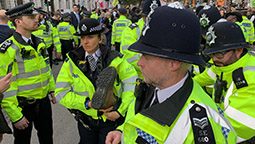A planned overhaul of the UK’s secrecy laws is causing concern among journalists and campaign groups who believe the plans could threaten investigative reporting and whistleblowers.
Under the Official Secrets Act, it is a criminal offence for current or former government employees to leak information considered damaging to the state. This encompasses information connected to security and intelligence, defence and international relations.
Proposed changes to the Act, published in a consultation paper in May, follow a review of the legislation by the Law Commission, originally commissioned in 2015 and published in September last year. Suggested amendments include extending the powers of the Act to cover British citizens overseas and non-British citizens.
The proposed changes are a significant concern for some journalists who believe they could infringe upon Article 10 of the Human Rights Act, which enshrines the right to freedom of expression.

Credit: Absolutvision / Unsplash
First created in 1911, the Official Secrets Act was updated in 1989. The law is particularly strict for all current and former intelligence officers – any unauthorised disclosure by them is automatically deemed an offence.
When you say the press or jurors don’t know what’s in the interest of national security, it’s because security services won’t tell us what is and isn’t in the interest of national security
Currently, anyone who publishes leaked information covered by the legislation can be prosecuted with an offence known as “onward disclosure”, which carries the same maximum two-year jail term that applies to officials leaking information. The changes proposed include considering increasing the maximum sentence from two to 14 years.
Although MPs attempted to introduce a specific public interest defence when the law was passed in 1989, the Act does not allow one.
In their consultation, the government argued that new technology, which enables entire documents to be uploaded to the internet, meant there was not “necessarily a distinction in severity” between spying and the most serious leaks.
“If you’re going to have something that doesn’t make any distinction between classes of person [sharing information], then you need some safeguards and they’ve never been in the 1911 or 1989 Act,” said Stephen Clark, barrister. “There’s no public interest defence. The Law Commission recommended that there should be some sort of public interest defence. What the Home Office has said in their consultation paper is that they think this is wrong. Their view is that the current system is adequate.”
Typically, the two defences available to people accused under the Act are to argue that they did know the disclosure would be damaging and to use the so-called “defence of necessity”, which argues that the disclosure acted to prevent a more serious crime from being committed.

Credit: Israel Andrade / Unsplash
Although the Home Office backed suggestions from the Law Commission that would increase the maximum sentences and bring more types of information in-scope, it did not endorse a recommendation to include a specific public interest defence. They say that it would not “strike the right balance” between press freedom and the “serious harm” caused by leaks.
“When you say the press or jurors don’t know what’s in the interest of national security, it’s because security services won’t tell us what is and isn’t in the interest of national security,” continued Clark. “There needs to be recognition that journalistic speech contains particular significance, not just in terms of human rights but in our whole system of holding the government to account.”
A number of journalists, media organisations and industry groups have criticised the Home Office’s plans.
“Government proposals to reform the Official Secrets Act are truly chilling and authoritarian,” said Michelle Stanistreet, National Union of Journalists general secretary. “They could brand journalists spies, just for doing their job. This has deep consequences for democracy and makes it easier for the government to block newspapers from revealing stories, such as ministers who break social distancing rules.”
While the government has highlighted that prosecutions under the Act are rare, campaigners are adamant that the proposed changes will pose a serious threat to public interest journalism and, in turn, to citizens’ human rights.




























